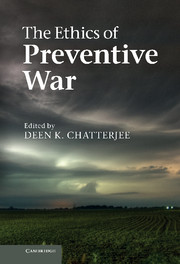Book contents
- Frontmatter
- Contents
- Contributors
- 1 Introduction
- PART I CONCEPTUAL, NORMATIVE, AND METHODOLOGICAL TERRAINS
- PART II INTERNATIONAL LAW
- 5 Does international law make a moral difference? The case of preventive war
- 6 Threat diplomacy in world politics: legal, moral, political, and civilizational challenges
- 7 Preventive war and trials of aggression
- PART III CRITIQUES OF PREVENTIVE WAR
- PART IV BEYOND PREVENTIVE WAR: EXPLORING OTHER OPTIONS
- Bibliography
- Index
- References
7 - Preventive war and trials of aggression
Published online by Cambridge University Press: 05 April 2013
- Frontmatter
- Contents
- Contributors
- 1 Introduction
- PART I CONCEPTUAL, NORMATIVE, AND METHODOLOGICAL TERRAINS
- PART II INTERNATIONAL LAW
- 5 Does international law make a moral difference? The case of preventive war
- 6 Threat diplomacy in world politics: legal, moral, political, and civilizational challenges
- 7 Preventive war and trials of aggression
- PART III CRITIQUES OF PREVENTIVE WAR
- PART IV BEYOND PREVENTIVE WAR: EXPLORING OTHER OPTIONS
- Bibliography
- Index
- References
Summary
Aggression should count as a crime against peace when there are serious violations of human rights involved in non-self-defensive war, not merely when borders are crossed. This opens the door for seeing preventive war as a form of aggression. Indeed, for hundreds of years, preventive war has been seen as a form of aggressive war that may trigger justified response in terms of armed conflict. Today preventive war may also be seen as a form of aggression that could trigger trials of those who are responsible for the initiation of such wars. But before that happens, preventive war needs to be distinguished from preemptive and anticipatory wars. Quite a bit can be learned from the just-war tradition in this respect.
Practically, one question to ask is what should be the mechanism for deciding when a war is aggressive, especially in those hard cases of preventive war. In international law, this issue is called the question of the “trigger.” Should a court make this determination or should a non-judicial body like the United Nations Security Council? And what criteria should be used to make such a determination as the first step in the prosecution of individual political and military leaders for the crime of aggression? This is an especially pressing issue in international criminal law as the International Criminal Court (ICC) has just been granted authority to begin prosecuting cases of the crime of aggression along with the other three crimes under the ICC’s jurisdiction, namely, crimes against humanity, genocide, and war crimes. If aggression is to be prosecuted internationally, should preventive war be one of the forms of aggression that is so prosecuted?
- Type
- Chapter
- Information
- The Ethics of Preventive War , pp. 101 - 118Publisher: Cambridge University PressPrint publication year: 2013
References
- 2
- Cited by



